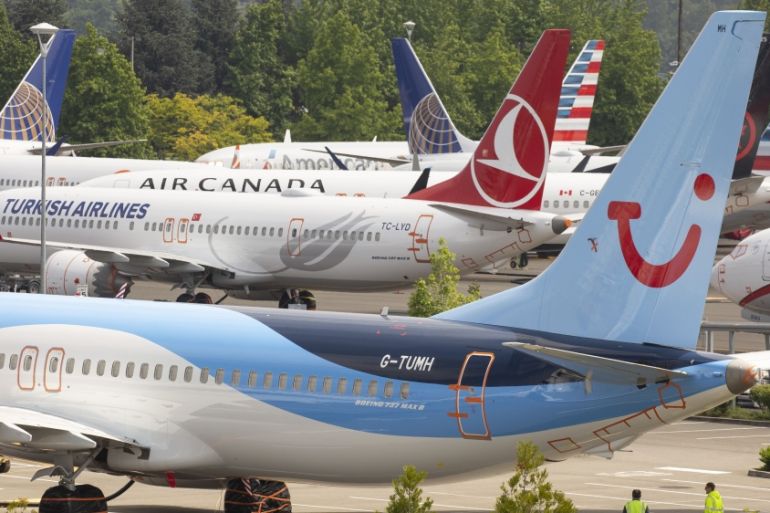US regulator cites new flaw on grounded Boeing 737 MAX
Fixing the problem will further delay the plane’s return to the skies after two deadly crashes, sources say.

The US Federal Aviation Administration (FAA) has identified a new risk that Boeing must address on its beleaguered 737 MAX aircraft before the grounded jet can return to service.
The risk was discovered during a simulator test last week and it is not yet clear if the issue can be addressed with a software upgrade, or will require a more complex hardware fix, sources with knowledge of the matter said on Wednesday.
Keep reading
list of 4 itemsMore than 11,000 evacuated in northern Indonesia as volcano erupts
Jordan, Lebanon, Iraq reopen airspace closed over Iran’s attacks on Israel
Australian women lose bid to sue Qatar Airways over 2020 strip searches
“Boeing agrees with the FAA’s decision and request and is working on the required software to address the FAA’s request,” Boeing said in a statement.
The FAA did not elaborate on the latest setback for Boeing, which has been working to get its best-selling aeroplane back in the air following a worldwide grounding in March in the wake of two deadly crashes within five months.
The new issue means Boeing will not conduct a certification test flight until July 8 in a best-case scenario, the sources said, but one source cautioned it could face further delays beyond that.
|
|
The FAA will spend at least two to three weeks reviewing the results before deciding whether to return the plane to service, they said.
Last month, FAA representatives told members of the aviation industry that approval of the 737 MAX jets could happen as early as late June.
The world’s largest plane-maker has been working on the upgrade for a stall-prevention system since a Lion Air crash in Indonesia in October, when pilots were believed to have lost a tug of war with software that repeatedly pushed the nose down.
A second deadly crash in March in Ethiopia also involved the system. The two accidents killed 346 people.
“On the most recent issue, the FAA’s process is designed to discover and highlight potential risks. The FAA recently found a potential risk that Boeing must mitigate,” the FAA said in the statement.
“The FAA will lift the aircraft’s prohibition order when we deem it is safe to do so.”
Boeing’s aircraft are being subjected to intense scrutiny and testing designed to catch flaws even after a years-long certification process.
It was not clear if the situation that resulted in an uncommanded dive can be addressed with a software update, or if it is a microprocessor issue that will require a hardware replacement.
A hardware fix could add new delays to the plane’s return to service.